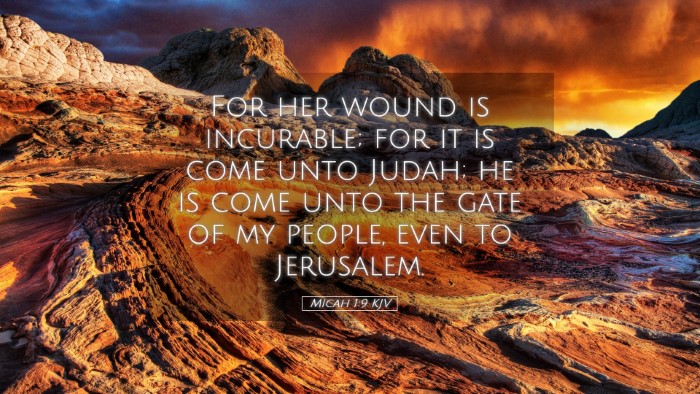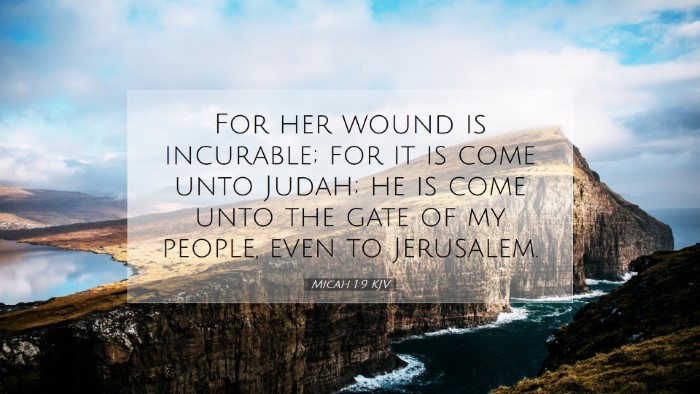Old Testament
Genesis Exodus Leviticus Numbers Deuteronomy Joshua Judges Ruth 1 Samuel 2 Samuel 1 Kings 2 Kings 1 Chronicles 2 Chronicles Ezra Nehemiah Esther Job Psalms Proverbs Ecclesiastes Song of Solomon Isaiah Jeremiah Lamentations Ezekiel Daniel Hosea Joel Amos Obadiah Jonah Micah Nahum Habakkuk Zephaniah Haggai Zechariah MalachiMicah 1:9
Micah 1:9 KJV
For her wound is incurable; for it is come unto Judah; he is come unto the gate of my people, even to Jerusalem.
Micah 1:9 Bible Commentary
Commentary on Micah 1:9
Verse: "For her wound is incurable; for it is come unto Judah; he is come unto the gate of my people, even to Jerusalem." (Micah 1:9, KJV)
General Overview
This verse conveys a profound sense of judgment and affliction that envelops both Israel and Judah. Micah, a prophet from Moresheth, addresses the people under the divine inspiration, warning them of impending consequences due to their transgressions. The phrase "her wound is incurable" indicates a grave situation—one that cannot be healed by human means but requires divine intervention.
Theological Insights
This verse emphasizes several theological concepts:
- The Nature of Sin: Micah reflects on the severity of sin, suggesting that it brings wounds that are deep and oftentimes beyond repair by earthly means.
- Divine Judgment: The mention of Judah alerts to the broader implications of judgment beginning with God's chosen people. This serves as a reminder that judgment starts at the household of God (1 Peter 4:17).
- Hope Amidst Judgment: While the wound is described as incurable, it is crucial to ponder how God's mercy calls for repentance and restoration, opening avenues of hope (Micah 7:18-19).
Commentary Summary from Notable Theologians
Matthew Henry's Commentary
Henry discusses the "wound" of Samaria, emphasizing that it signifies both physical and spiritual ailments of the nation. He posits that the "incurable" aspect of the wound suggests the depth of Israel's sins and the inevitable judgment that follows. Henry notes that this predicament extends to Judah, highlighting the relation and effect of Israel's downfall on its southern neighbor. The gates of Jerusalem represent a significant point of entry, both physically and spiritually, symbolizing the vulnerability of the people as they face divine ramifications.
Albert Barnes' Commentary
Barnes provides an interpretation outlining that the "wound" refers explicitly to the national calamity and spiritual decline of the people. He articulates that the "gate" of Jerusalem illustrates the epicenter of the nation's governance and morality. Judah’s proximity to such turmoil signals a warning; the fall of one can influence the standing of another. Barnes further adds that the incurable nature of the wound speaks to the gravity of sin and the potential desolation faced if repentance is not sought as a community.
Adam Clarke's Commentary
Clarke draws attention to the metaphorical implications of the "wound" as Micah speaks to the spiritual malaise affecting Judah. He brings to light the notion that God allows such conditions as a catalyst for reflection and contrition among His people. Clarke emphasizes the consequences of neglecting God’s covenant, suggesting that such a wound may lead to the eventual destruction and exile—historically observed in the Babylonian captivity. His insights encourage readers to consider the communal aspect of sin and the necessity of collective responsibility toward repentance.
Historical Context
The context of Micah’s prophecy is set against a backdrop of political instability and moral decay during the period leading to the Assyrian invasion. The judgment pronounced upon Israel is a harbinger of what is to come upon Judah if they do not return to God. This serves as a historical warning to God's people about the ripple effects of sin and rebellion against divine principles.
Application for Today
This verse remains relevant as it brings forward themes that resonate within contemporary church settings and personal lives.
- Awareness of Sin: Just as Judah was called to recognize their moral failings, modern believers must remain vigilant against complacency in their spiritual walk.
- The Urgency of Repentance: The description of an "incurable wound" serves as a grave reminder of the seriousness of turning away from God, urging communities to seek restoration and revival.
- Collective Responsibility: Like Judah, churches today must collectively address issues of sin within their midst, understanding that individual actions have communal consequences.
Conclusion
Micah 1:9 emphasizes the severity of sin and its repercussions, calling for a return to God amidst judgment. The insights from Matthew Henry, Albert Barnes, and Adam Clarke provide a rich tapestry of understanding, urging modern readers—pastors, theologians, and laypeople alike—to engage deeply with the text. With a hope that transcends judgment, this prophetic voice encourages actionable responses of repentance and fidelity to God's covenant, vital for spiritual renewal.


